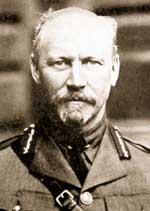Jan Christiaan Smuts

General i den sydafrikanske hær.
- Johannesburg, 1900
- Rufiji-floden, 1917
Jan Christian Smuts was born in Malmesbury, Cape Colony in 1870. Educated at Christ's College, Cambridge he returned to South Africa where he became the state attorney of Johannesburg and a member of Paul Kruger's government. In 1899 Smuts contributed to A Century of Wrong, a pamphlet that explained the Boer case against Britain.
During the Boer War (1899-1902) Smuts established himself as a guerrilla leader of exceptional talent. Smuts was also one of the leading negotiators involved in the production of the Vereeniging Peace Treaty (1902). An opponent of extreme nationalism, Smuts argued that South Africa's future lay in co-operation with Britain.
Smuts held a succession of cabinet posts, including defence minister, under President Louis Botha but on the outbreak of the First World War, Smuts rejoined the army and led South Africa's successful campaign in German East-Africa.
In 1917 David Lloyd George invited Smuts to join the Imperial War Cabinet in London. He soon obtained a high reputation and was an influential figure in devising Allied war strategy. While in England he played a leading role in establishing the Royal Air Force.
At the Paris Peace Conference, Smuts worked closely with Woodrow Wilson, in advocating a League of Nations. Smuts returned to South Africa after the signing of the Versailles Treaty in 1919 and soon afterwards became prime minister. Smuts lost power in 1924 but later returned to office as deputy prime minister (1933-39) and prime minister (1939-48).
Smuts worked closely with Winston Churchill during the Second World War and was the only man to sign the peace treaties at the end of both wars. Smuts was also a leading figure in the drafting of the United Nations Covenant. Jan Christian Smuts died in 1950.